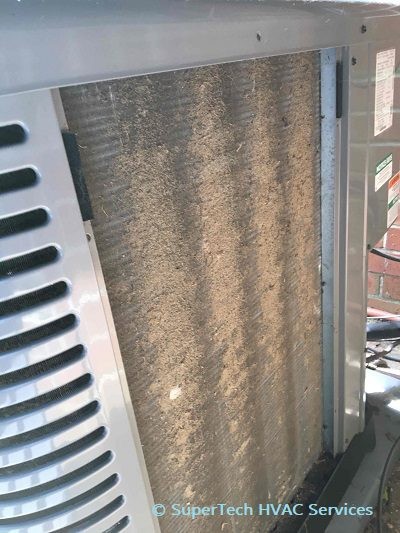It’s a sweltering summer day, and you expect a refreshing blast of cold air when you turn on your air conditioner. Instead, you’re greeted with warm or hot air blowing from your vents. This frustrating situation is a common homeowner problem, and understanding the potential reasons behind it is the first step to getting your cool air back. Let’s explore seven possible culprits for why your AC is blowing hot air.
Simple Thermostat Issues
Before diving into complex mechanical problems, start with the simplest checks: your thermostat. It’s surprisingly common for thermostat settings to be the reason for warm air.
First, ensure your thermostat is actually set to the COOL mode. Accidentally setting it to HEAT or FAN ONLY will obviously result in hot air. Next, verify that the fan setting is on AUTO, not ON. When set to AUTO, the fan only operates when cool air is ready to be circulated. If it’s set to ON, the fan runs constantly, even when the compressor isn’t cooling, potentially blowing warm air. Finally, double-check that your desired temperature setting is lower than the current room temperature.
If your thermostat settings are correct and the issue persists, the problem likely lies within your air conditioning system itself.
Airflow Obstructions and Frozen Evaporator Coil
A frozen evaporator coil is a frequent cause of ACs blowing hot air. The evaporator coil, filled with refrigerant, is responsible for absorbing heat from the indoor air. However, if the coil becomes too cold, it can freeze over, hindering its ability to cool.
What causes an evaporator coil to freeze? Often, it’s related to restricted airflow. When warm air doesn’t adequately circulate around the coil, the refrigerant gets too cold and freezes moisture on the coil. This airflow blockage can stem from several sources:
-
Dirty Air Filter: A clogged air filter restricts airflow across the evaporator coil. Dust and debris trapped in a dirty filter prevent warm air from reaching the coil, leading to freezing. Regular air filter replacement is crucial for maintaining proper AC function.
-
Blocked Return Vents: Ensure that your return air vents are not obstructed by furniture, curtains, rugs, or any other household items. These vents are essential for drawing warm air into the AC system to be cooled.
-
Collapsed or Damaged Air Ducts: Less commonly, a collapsed or damaged air duct can severely restrict airflow. Ductwork can collapse due to age, poor installation, or damage from pests. If air cannot reach the evaporator coil through the ducts, freezing can occur.
-
Dirty Evaporator Coil: Over time, the evaporator coil itself can become coated with dust and grime, even with regular filter changes. This layer of dirt insulates the coil, reducing airflow and potentially leading to freezing. A dirty coil can also contribute to a musty smell in your home.
If you suspect a frozen coil, turn off your AC system and allow it to thaw for several hours. Check and address any potential airflow restrictions, such as replacing a dirty air filter. If the problem recurs, or if you suspect a refrigerant leak, professional help is necessary.
Refrigerant Leaks
Refrigerant is the lifeblood of your AC system, responsible for absorbing and releasing heat. Low refrigerant levels due to a leak can cause a variety of problems, including a frozen evaporator coil and, consequently, warm air blowing from your vents.
Your AC operates as a closed-loop system, meaning refrigerant should not be consumed. If your refrigerant level is low, it indicates a leak in the system. As refrigerant leaks, the pressure drops, causing the remaining refrigerant to over-expand and supercool the evaporator coil to the point of freezing. Once frozen, the coil cannot effectively absorb heat, and your AC will blow warm air.
Refrigerant leaks require professional attention. An HVAC technician can perform a “leak search” to pinpoint the leak, repair the damaged refrigerant line, and recharge the system with the correct type and amount of refrigerant. Do not attempt to handle refrigerant yourself, as it requires specialized equipment and knowledge and is also regulated for environmental reasons.
Dirty Condenser Coil
The condenser coil is located in your outdoor AC unit and is responsible for releasing heat extracted from your home to the outside air. If the condenser coil is dirty, it cannot efficiently dissipate heat, which can lead to reduced cooling capacity and warm air blowing indoors.
 dirty-condenser-coil
dirty-condenser-coil
The outdoor condenser unit is exposed to the elements, making it susceptible to accumulating dirt, leaves, pollen, grass clippings, and other debris. This buildup insulates the coil, preventing proper heat exchange. Furthermore, ensure the area around your outdoor unit is clear of obstructions, providing at least two feet of clearance for adequate airflow. Restricted airflow around the condenser unit can also lead to overheating and reduced cooling efficiency. Regular cleaning of the condenser coil and the surrounding area is essential for optimal AC performance.
Compressor Failure
The compressor is the heart of your AC system. It circulates refrigerant throughout the system, compressing it and increasing its temperature in the process. A malfunctioning or failing compressor is a serious issue that can result in your AC blowing hot air.
Compressor problems can arise from age, electrical issues, or internal mechanical failures. An aging compressor may draw excessive electricity, potentially tripping circuit breakers and causing the AC to stop cooling. Internal contamination from rust or metal particles can also impede refrigerant flow and compressor function. In severe cases, a grounded compressor, caused by damaged motor wiring, may necessitate compressor replacement or even replacement of the entire outdoor unit.
Diagnosing compressor issues often requires specialized knowledge and equipment. If you suspect a compressor problem, it’s best to consult a qualified HVAC technician for a professional assessment and repair.
Condenser Fan Problems
The condenser fan, also located in the outdoor unit, plays a crucial role in expelling heat from the condenser coil. If the condenser fan malfunctions, the condenser coil can overheat, leading to system shutdown and warm air blowing indoors.
A common cause of condenser fan failure is a burnt-out fan motor, often due to normal wear and tear. Damage to the fan blades, bearings, or obstruction from debris can also prevent the fan from spinning properly. Without proper fan operation, the condenser coil cannot release heat effectively, and the AC’s cooling capacity is significantly reduced.
Similar to compressor issues, diagnosing and repairing condenser fan problems is typically best left to a professional HVAC technician. They can identify the cause of the fan malfunction and recommend the appropriate repair, whether it’s motor replacement, fan blade repair, or other necessary fixes.
Power Loss to Outdoor Unit
Finally, a simple but often overlooked reason for an AC blowing hot air is a loss of electrical power to the outdoor condenser unit. This could be due to a tripped circuit breaker or a switched-off disconnect box.
Older AC systems, especially when working harder on hot days, can sometimes overload electrical circuits, causing a fuse to blow or a circuit breaker to trip. Check your electrical panel for tripped breakers and reset any that are tripped.
Your AC system also has a disconnect box, usually located near the outdoor unit, which allows for manual power shut-off for maintenance or safety. Ensure that this disconnect box hasn’t been accidentally switched off.
If power loss is the issue, restoring power may resolve the problem. However, if circuit breakers trip repeatedly, it could indicate a more serious electrical problem within the AC system that requires professional diagnosis and repair.
In conclusion, if your AC is blowing hot air, systematically checking these seven potential causes can help you identify the problem. While some issues, like thermostat settings or dirty air filters, are simple DIY fixes, others, such as refrigerant leaks, compressor failures, and electrical problems, necessitate the expertise of a qualified HVAC technician. Promptly addressing AC issues not only restores your comfort but also prevents further damage and potentially more costly repairs down the line.
